Hollywood’s ‘Pride’ and Joy
- Share via
MGM meant well when it decided in the 1930s to bring the classics of literature to the screen. But the results were mixed: For each moving “A Tale of Two Cities” there was a plodding “David Copperfield.”
But the studio did everything right when it brought “Pride and Prejudice,” Jane Austen’s tale of manners and morals in early 19th-Century England, to the screen.
The 1940 film faithfully tells the story of the five Bennet sisters and their romantic adventures, centering on the second-eldest daughter, the clearheaded and witty Elizabeth, played with great charm by Greer Garson.
A dashingly handsome Laurence Olivier is the snobbish Mr. Darcy, the man she loves to hate, and their oh-so-polite verbal sparring is the highlight of the film.
Mr. Darcy first meets the Bennet clan at a ball, where his unconcealed arrogance earns him the disdain of the entire group. It doesn’t help that Elizabeth overhears him refer to her as “tolerable enough” but not worth asking to dance.
But Mr. Darcy’s comeuppance is on the horizon, and it arrives in a form he is least able to combat: love.
Soon Elizabeth, too, finds herself challenged to overcome her prejudices. Has she misjudged the insufferable Mr. Darcy?
Austen’s eccentric cast of characters is done full justice in this adaptation. Mary Boland, as the dizzy mother of the brood, laments hourly and loudly on the fate of her daughters, who--because there is no male heir--will see the family inheritance pass on to a cousin. And Edmund Gwenn is the definition of droll as her long-suffering husband, whose idea of paradise is a place where no one talks more than is absolutely necessary.
Other standouts are Melville Cooper as the fawning Mr. Collins and Edna May Oliver as Lady Catherine, who is fond of explaining that she would have been a great pianist, dancer, painter, etc., had she had the inclination to learn.
Though the moral quandaries that form the heart of the story are more than a bit dated, that is their charm. And for anyone who has ever been embarrassed by family, frustrated in the search for true love, or who believes in happy endings, “Pride and Prejudice” will deliver more than a few smiles.
“Pride and Prejudice” (1940), directed by Robert Z. Leonard. 116 minutes. Not rated.
More to Read
Only good movies
Get the Indie Focus newsletter, Mark Olsen's weekly guide to the world of cinema.
You may occasionally receive promotional content from the Los Angeles Times.










